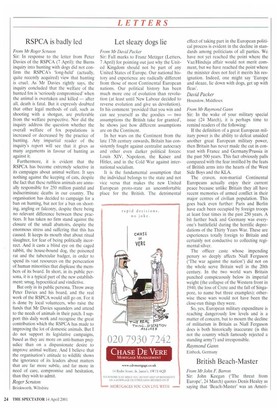RSPCA is badly led
From Mr Roger Scruton Sir: In response to the letter from Peter Davies of the RSPCA (7 April): the Burns inquiry into hunting with dogs did not confirm the RSPCA's 'long-held' (actually, quite recently acquired) view that hunting is cruel. As Mr Davies rightly says, the inquiry concluded that the welfare of the hunted fox is 'seriously compromised' when the animal is overtaken and killed — after all, death is fatal. But it expressly doubted that other legal methods of cull, such as shooting with a shotgun, are preferable from the welfare perspective. Nor did the inquiry address the question whether the overall welfare of fox populations is increased or decreased by the practice of hunting. Any impartial reader of the inquiry's report will see that it gives as many arguments in favour of hunting as against it.
Furthermore, it is evident that the RSPCA has become extremely selective in its campaigns about animal welfare. It says nothing against the keeping of cats, despite the fact that these ruthless animals are annually responsible for 250 million painful and indiscriminate deaths in our country. The organisation has decided to campaign for a ban on hunting, but not for a ban on shooting, angling or falconry, despite there being no relevant difference between these practices. It has taken no firm stand against the closure of the small abattoirs, despite the enormous stress and suffering that this has caused. It keeps its mouth shut about ritual slaughter, for fear of being politically incorrect. And it casts a blind eye on the caged rabbit, the house-bound dog, the poisoned rat and the tubercular badger, in order to spend its vast resources on the persecution of human minorities that displease the members of its board. In short, in its public persona, it is a typical part of the new establishment: smug, hypocritical and vindictive.
But only in its public persona. Throw away Peter Davies and his board, and the real work of the RSPCA would still go on. For it is done by local volunteers, who raise the funds that Mr Davies squanders and attend to the needs of animals in their patch. I support this daily work and recognise the great contribution which the RSPCA has made to improving the lot of domestic animals. But I do not support its legislative campaigns, based as they are more on anti-human prejudice than on a dispassionate desire to improve animal welfare. And I believe that the organisation's attitude to wildlife shows the ignorance of its leaders about matters that are far more subtle, and far more in need of care, compromise and hesitation, than they wish to admit.
Roger Scruton
Brinkworth, Wiltshire


























































 Previous page
Previous page